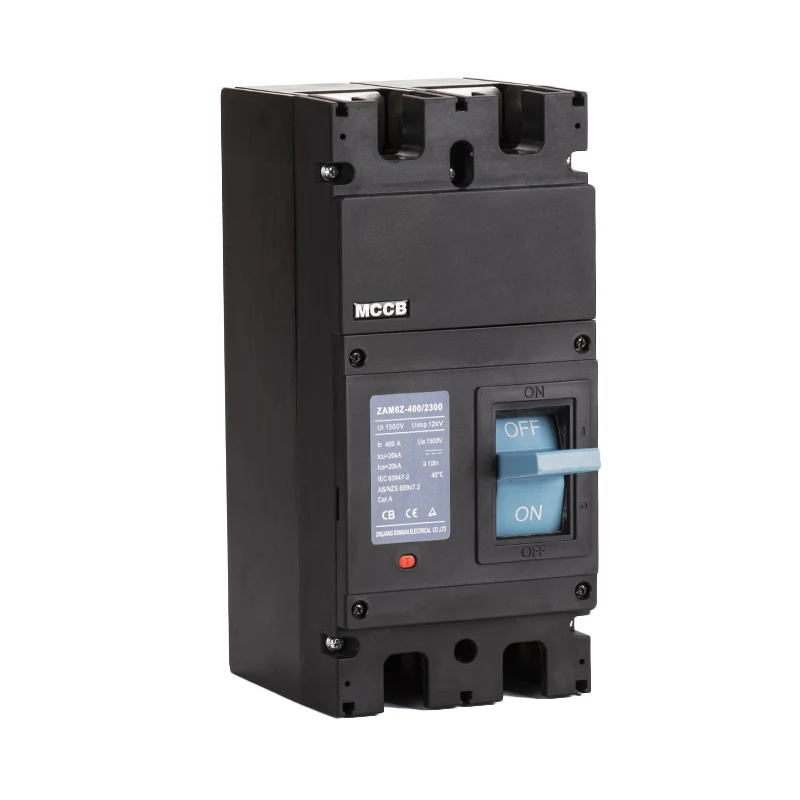Understanding DC MCCB: A Vital Component for Electrical Safety
2025-03-04
In the world of electrical systems, safety is paramount. To protect sensitive equipment and ensure the safety of personnel, circuit protection devices are essential. One such device is the DC MCCB (Direct Current Molded Case Circuit Breaker), an important component in industrial and commercial electrical systems. In this blog, we will delve into the functions, benefits, and applications of DC MCCBs, explaining why they are crucial for ensuring efficient and safe electrical operations.
What is a DC MCCB?
A DC MCCB, or Direct Current Molded Case Circuit Breaker, is a type of circuit protection device designed to protect electrical circuits in systems that use direct current (DC) power. Unlike traditional AC MCCBs, which are designed for alternating current systems, DC MCCBs are specifically engineered to handle the unique characteristics of DC circuits.
These devices are housed in a molded case, which provides robust insulation and physical protection for the internal components. They function by automatically interrupting the current flow in the event of an overload, short circuit, or fault, preventing potential damage to equipment, reducing fire risks, and ensuring the safety of electrical systems.
Why DC MCCBs Are Important
1. Protection Against Overload and Short Circuits
The primary function of any circuit breaker is to protect electrical circuits from damage due to overloads or short circuits. When the current flowing through a circuit exceeds its rated capacity, it can cause overheating, which can damage wires, components, and even cause fires. A DC MCCB detects these issues and automatically interrupts the current, preventing further damage and maintaining the safety of the system.
2. Handling Direct Current Circuits
DC circuits, such as those found in renewable energy systems (solar panels, for example) and battery-powered systems, behave differently than AC circuits. In an AC system, the current alternates direction, while in a DC system, the current flows in one direction. This unidirectional flow can make interrupting the current more challenging, as there is no natural zero crossing point as with AC. DC MCCBs are specifically designed to handle these challenges, providing reliable protection for DC circuits in various applications.
3. Enhanced Safety Features
DC MCCBs are equipped with features that enhance the safety of electrical systems. These features include thermal-magnetic protection, which provides both overload protection (via thermal response) and short-circuit protection (via magnetic response). By detecting and responding to electrical faults quickly, DC MCCBs reduce the risk of fire and equipment failure, ensuring safer operation in industrial, commercial, and residential settings.
4. Durability and Reliability
Molded case circuit breakers, including DC MCCBs, are known for their durability and reliability. The molded case provides a protective enclosure that is resistant to external elements such as dust, moisture, and mechanical impact. This makes them suitable for use in harsh environments, such as factories, power plants, and outdoor settings. DC MCCBs can endure significant wear and tear while continuing to perform their critical function of circuit protection.
Benefits of Using DC MCCBs
1. Prevention of Damage to Electrical Equipment
Overcurrent events, such as surges or short circuits, can cause irreversible damage to electrical equipment. By interrupting these harmful currents before they reach damaging levels, DC MCCBs help preserve the lifespan of valuable equipment. This protection extends to generators, inverters, transformers, and other critical components, ensuring they operate efficiently and safely.
2. Reduced Downtime
In the event of a fault, the quick response of a DC MCCB minimizes downtime. Instead of waiting for manual intervention to fix the problem, the circuit breaker automatically cuts off power to the affected circuit, preventing further damage. This results in faster recovery times and less disruption to operations, improving overall system efficiency.
3. Cost Efficiency
While the initial cost of a DC MCCB may be higher than simpler fuses or other circuit protection devices, they offer long-term cost savings. The prevention of electrical damage, reduced maintenance, and fewer equipment replacements lead to lower operating costs over time. Additionally, DC MCCBs can be reset after a fault, eliminating the need for frequent replacements like traditional fuses.
4. Adaptability to Different Applications
DC MCCBs are versatile and can be used in a wide range of applications. From renewable energy systems and industrial machinery to residential solar power systems, these circuit breakers offer flexible protection for various types of DC circuits. Their adaptability to different voltage ratings and current capacities makes them suitable for many different sectors, from commercial buildings to remote off-grid locations.
Applications of DC MCCBs
1. Solar Power Systems
As renewable energy sources like solar power become more popular, the need for DC circuit protection grows. Solar panel systems, especially those with large battery banks or inverters, operate on direct current. DC MCCBs are commonly used in solar power installations to protect the solar panels, inverters, and battery banks from overcurrent conditions, ensuring the longevity and safety of the entire system.
2. Electric Vehicles (EVs)
Electric vehicles rely heavily on DC power for their motors and batteries. DC MCCBs are used in electric vehicles to protect the electrical components from overloads and short circuits, ensuring the vehicle operates safely and efficiently. These breakers are essential in protecting battery packs, chargers, and other critical EV systems.
3. Data Centers
Data centers, which house thousands of servers and other critical electronic equipment, require highly reliable circuit protection. DC MCCBs are used in data centers to protect the DC circuits that power the servers, cooling systems, and backup power supplies. By preventing overcurrent issues, DC MCCBs ensure the uninterrupted operation of data centers, minimizing the risk of downtime and data loss.
4. Industrial and Commercial Applications
In industrial settings, where large motors, machines, and equipment operate on DC power, DC MCCBs are vital for protecting these assets. From manufacturing plants to power plants, these circuit breakers safeguard against electrical faults, ensuring efficient and safe operations.
5. Battery Backup Systems
Battery backup systems, often used for uninterruptible power supply (UPS) or off-grid applications, rely on DC power for storing and distributing electricity. DC MCCBs protect the battery circuits and prevent overcurrent situations, ensuring the system operates smoothly and efficiently, even during power surges or faults.
Conclusion
The DC MCCB is an essential component in the safe operation of DC-powered electrical systems. Offering reliable protection against overcurrent and short circuit conditions, these circuit breakers help preserve valuable equipment, reduce downtime, and ensure the safety of electrical installations. Their versatility, durability, and adaptability make them indispensable in a wide range of applications, including solar power systems, electric vehicles, data centers, and industrial machinery.
As the world continues to embrace renewable energy and DC-powered systems, the importance of DC MCCBs will only grow. Investing in high-quality DC MCCBs is a smart choice for any business or facility that relies on direct current circuits, providing long-term protection and peace of mind.



